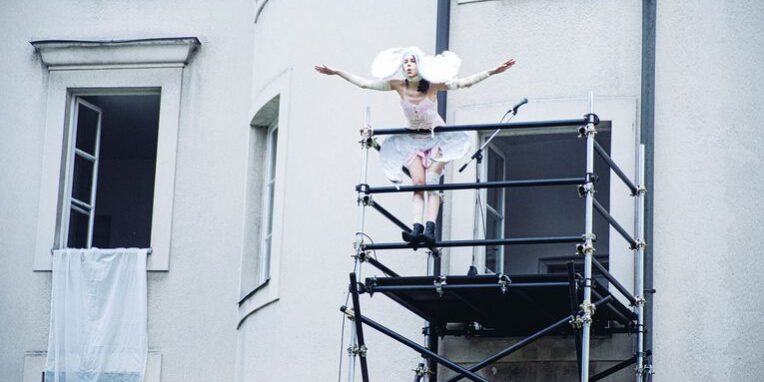As the year draws to a close, SEEstage’s writers across the region discuss the shows that made a lasting impression on them in 2023.
As with last year’s list, rather than an attempt to select the ‘best’ shows of the past 12 months, our writers have chosen their personal favourites, the shows that have had the strongest impact on them.
Angels in America (Mladinsko Theatre)
Chosen by Nora Čulić Matošić
I first discovered Nina Rajić Kranjac last year when I saw her award-winning play Solo. That show changed my outlook on theatre – what it was, what it is now and what it can be. To this day, it is the most memorable performance for me. The energy that the actors carried throughout the performance was otherworldly, unlike most of the plays I have seen so far. When it was announced she was adapting Tony Kushner’s Angles in America: A Gay Fantasia on National Themes, my expectations were high. In this six-hour-long adaptation of a complex two-part play, the actors bring forth that same magical dynamic which transports the audience to their fictional theatre world that seems more real than outside reality itself. This spatial aspect is particularly interesting in how expandable the performance area is, the way it intertwines and co-exists equally with its surroundings when the performance takes place in front and back yard of Mladinsko Theatre. The wideness of the used space corresponds to the complexity of the piece, as it tackles themes of (homo)sexuality, (internalized) homophobia, illness, death and its meaning, all that makes life – life.
Read our review of Angels in America
Negotiating Peace (Qendra Multimedia)
Chosen by Florida Kastrati

Negotiating Peace. Photo Adhe Mulla
I was thinking about Negotiating Peace written by Jeton Neziraj and directed by Blerta Neziraj, for days afterwards. I am not talking only from a local perspective, the depth, complexity, and variety of ideas this drama explored stretch to the global, addressing not only the torments inflicted on us by politicians but those of the whole world. Inspired by a memoir about the creation of the Dayton Agreement and Ismail Kadare’s book The General of the Dead Army, its themes are both resonant and relevant, and would be of interest to a wide group of people, beyond the Balkan context. It combines the absurd and the comic with the vulgar truth; it’s more than a story about nations, it’s a story about people.
Desire to Make a Solid History Will End Up in Failure (Station Service for Contemporary Dance)
Chosen by Borisav Matić
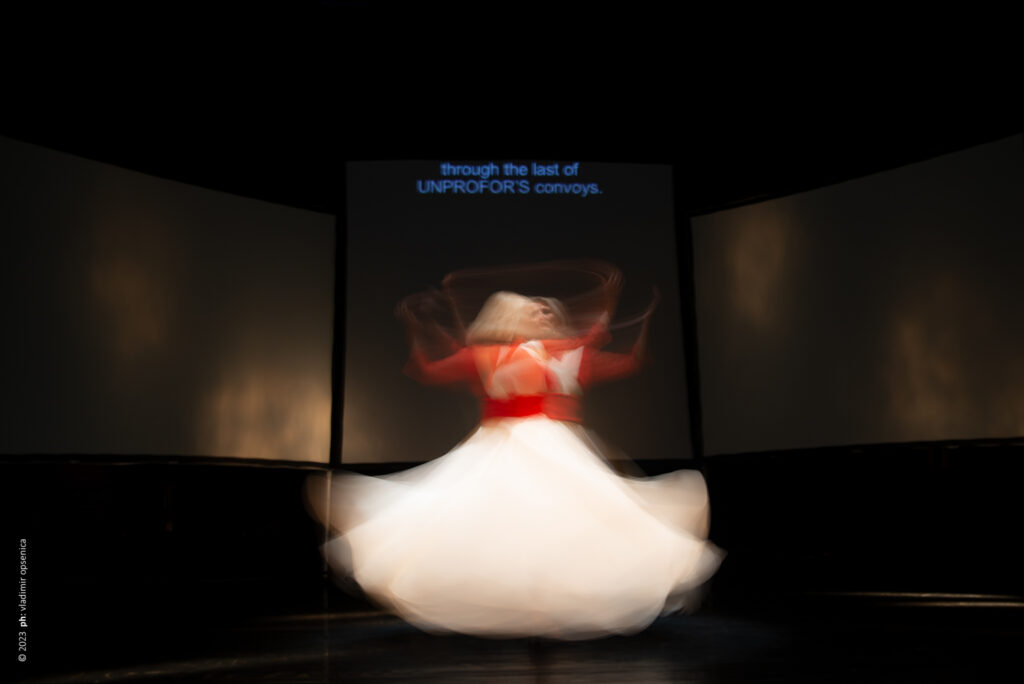
Desire to Make a Solid History will End in Failure. Photo: Vladimir Opsenica
Gadjo (the young europeans) (Qendra Multimedia/National Experimental Theatre)
Chosen by Flamur Dardeshi
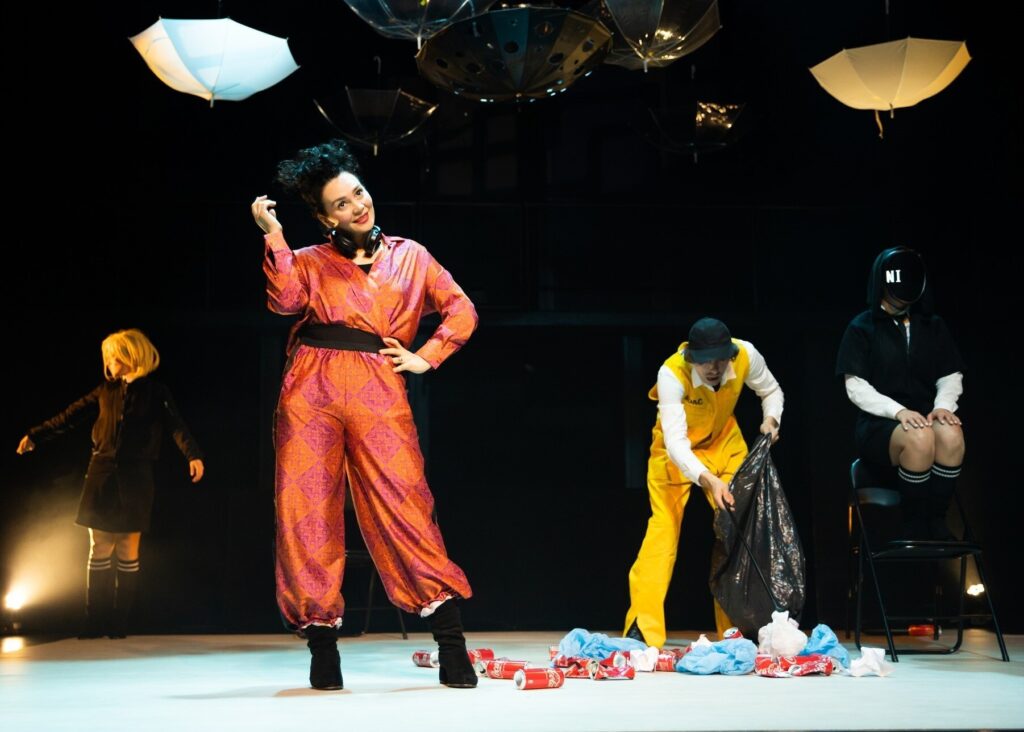
Gadjo (the young europeans)
Created by Jeton and Blerta Neziraj for Qendra Multimedia in collaboration with Tirana’s Experimental Theatre, this new play which premiered this spring in Tirana took racism against Roma as its theme. In the play’s title Jeton Neziraj chooses a racist term like Gadjo to describe the young Europeans. The positioning is clear: we see through the eyes of the Roma. This perspective is one of the play’s most powerful elements. It clearly highlights the depth of the racism to us. I like it when a play is inspired by a true event, as is the case here, and uses those stories to highlight issues that we see in our society.
In the show, a Roma girl, portrayed brilliantly by Edona Reshitaj, gets kicked out of Belgium and sent back to Kosovo. She is eager to explore her new surroundings and views events that occur to her with naive optimism, but she is demonized in the media as a child thief, which results in her being physically assaulted. Her supposed guilt is based solely on prejudice blended with fantasy. The result is a well constructed show with striking visual effects and strong use music impressively directed by Blerta Neziraj.
Read our review of Gadjo (the young europeans)
Still Alice (SNG Drama Ljubljana)
Chosen by Živa Kadunc
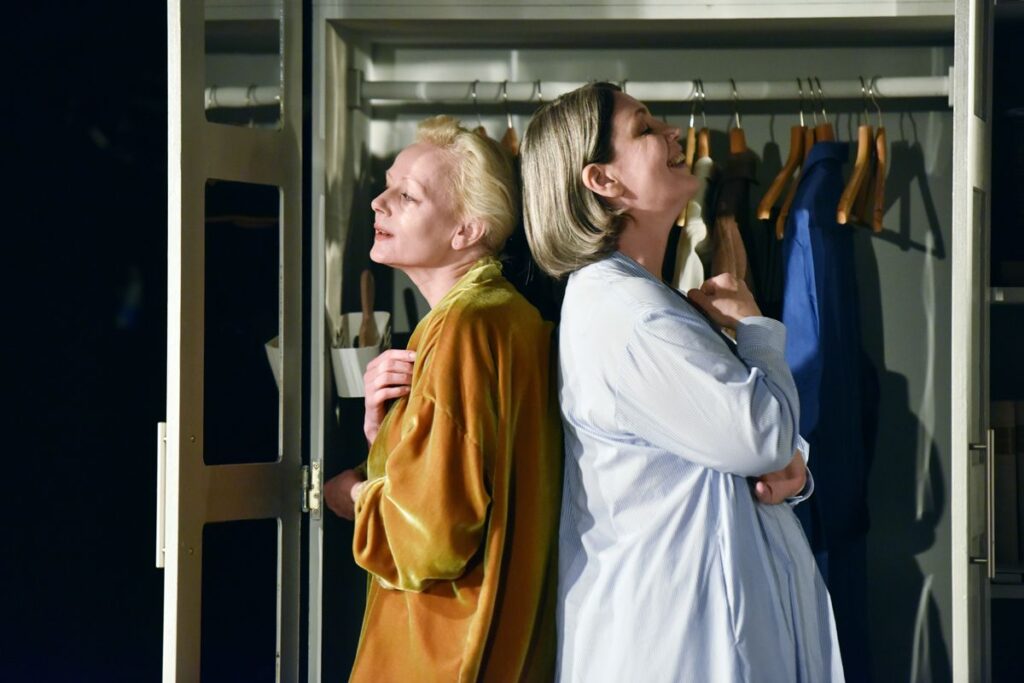
Still Alice. Photo: Peter Uhan
Progress is what most defines our society. Progress is what we think we should inevitably and surely look forward to and prioritise. We constantly seek out innovation, we search out the things that would drive us forward; stories we once heard are no longer enough for us, once brilliant concepts soon become boring, differential forms or constructs are just a new mask for things already known and felt.
Based on a novel by neuroscientist Lisa Genova, adapted by Christine Mary Dunford, and directed by Matjaž Zupančič, Still Alice is a simple and not in the slightest bit innovative staging of a story about a neuro-linguist, Alice, who is suffering from dementia. And although this could have been the same old story told once more, it hits us in a place that we still cannot control – it brings us into emotional terrain, a greatly detailed and naturalistically presented world of pain, pride, love and loss, with acting so organic, and directing and dramaturgy so precise that we can truly believe that this story is real.
Read our review of Still Alice
The Tin Drum (Yugoslav Drama Theatre)
Chosen by Ana Ogrizović
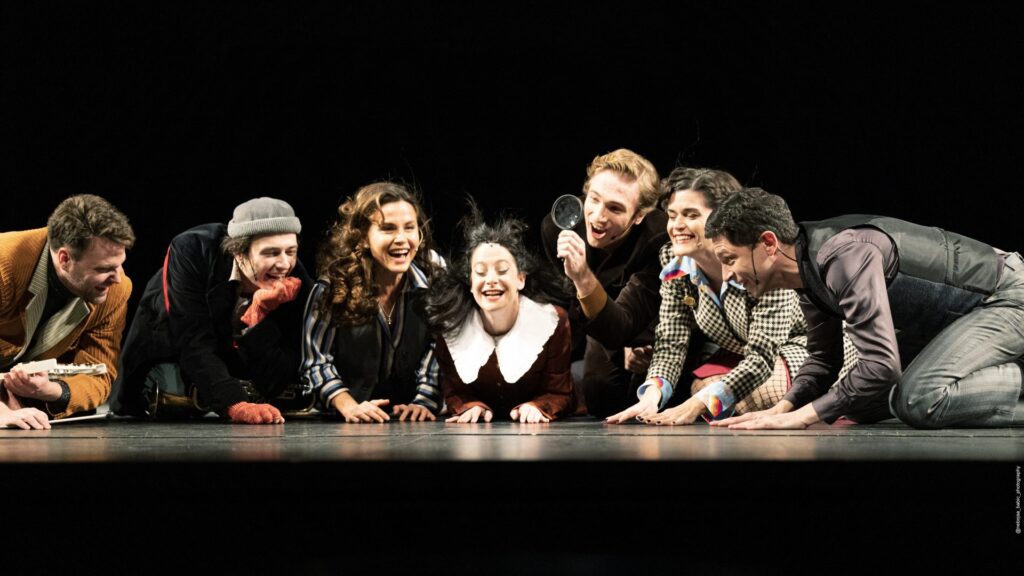
The Tin Drum. Photo Nebojsa Babic
My favourite show of 2023 was The Yugoslav Drama Theatre production of The Tin Drum, directed and adapted by Vasil Hristov. This intrugiung performance places Günter Grass’ well known story about coming of age in traumatic times in a metatheatrical setting (dramaturgy by Vesna Radovanović). The actors portray several different characters (including themselves as actors throughout the creative process) with sublime precision, never losing their unique points of view. Sharp social commentary and political criticism, quite relevant to contemporary world events, is presented through the un-censorable protagonist Oskar (Miodrag Dragičević). The minimalistic setting subtly but steadily assists the story to a climax in the end,
when the living and the dead sit in chairs and get lifted above the ground, creating a dance macabre-ish carousel. Devastating with a great sense of humour, this performance evoked many questions and left me speechless as I exited the theatre.
Illuminating the case of a series of murders by poisoning in the Ćuprija district in the seventies of the 19th century
Chosen by Andrej Čanji
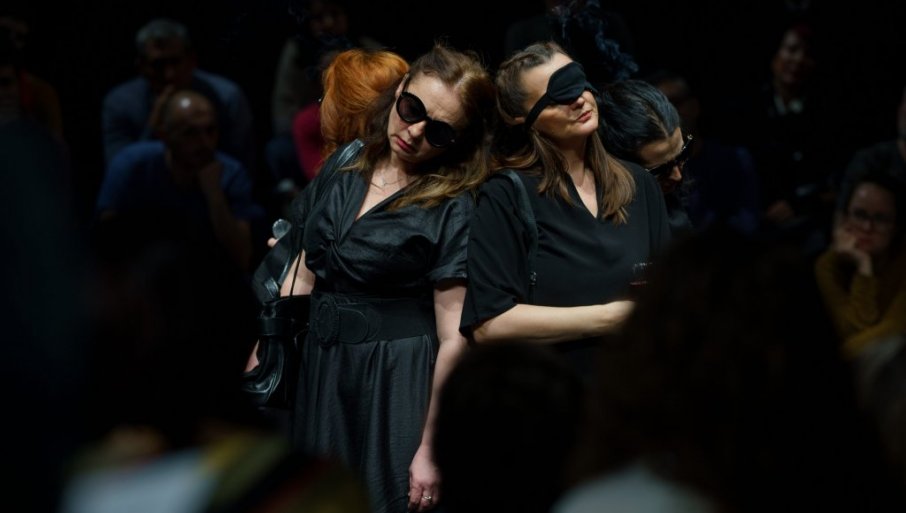
Rasvetljavanje slučaja serije ubistava trovananjem u ćuprijskom okrugu sedasmdesetih godina 19.veka
I am particularly affected when something that deviates from convention goes unnoticed and is ignored, or when something is viewed with elitist suspicion. Documentary theatre, forum theatre and immersive theatre remain rarities on Serbian stages. Even when they are performed not in theatre halls but in ordinary spaces, when there are no large and expensive sets and costumes, just seven actresses in ordinary black dresses performing in the middle of the audience that consists of several rows of chairs arranged in concentric circles, it is guaranteed that festivals and journalists will ignore something that is at once modest and unusual.
It is one such performance that impressed me the most this year. And that’s not just because of my sensitivity to unnoticed phenomena, but also because it really is a great artistic achievement. I’ve seen the play three times, each time with a different group of friends, but with the same mutual enthusiasm.
In 1875, eighteen women are on trial at the district court in Ćuprija for murder by poisoning. The victims were mostly the husbands of the accused, all the crimes were committed in the town of Svilajnac and the nearby villages of Markovac and Sedlare, and the quack doctor Kadivka was at the centre of the criminal network. Drawing on this true story, which was recorded in court records and history books, as well as on the laws and folklore of the time described in sociological and ethnographic studies, a theatre play was created with the long title of Rasvetljavanje slučaja serije ubistava trovananjem u ćuprijskom okrugu sedasmdesetih godina 19.veka
Although two local theatres from Serbia, a village cultural centre and an independent art group from Belgrade are behind the play, Anđelka Nikolić stages it in an extremely visually modest but artistically very rich way. The actresses sometimes immerse themselves in the incredible story, sometimes they distance themselves critically from it. The case of each of the eighteen women is re-enacted in detail. The roles of judge and witness are assigned to the audience, who are invited to participate and comment on the events and sing along with the convicts. The patriarchal legal framework in 19th-century Serbia is described in detail, the sociological origins of folklore are presented and compared with the modern value system.
This educational journey through time, a rollercoaster of emotions performed by an extremely committed female ensemble, is for me a hidden gem of the 2023 theatre year in Serbia.
Natasha Tripney is a writer, editor and critic based in London and Belgrade. She is the international editor for The Stage, the newspaper of the UK theatre industry. In 2011, she co-founded Exeunt, an online theatre magazine, which she edited until 2016. She is a contributor to the Guardian, Evening Standard, the BBC, Tortoise and Kosovo 2.0

